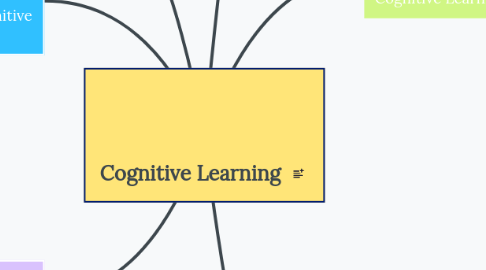
1. General
1.1. Cognitive learning is an active way of learning that can help you realize your brain's potential.
2. Components of Cognitive Learning
2.1. Comprehension
2.1.1. The first step is to understand the importance of cognitive learning
2.2. Memory
2.2.1. Linking new information to past experience
2.3. Application
2.3.1. Apply what you have learned to real life situations and reflect on them
3. Сognitive Learning Theories
3.1. Cognitive Learning Theory
3.1.1. Cognitive learning theory explains how internal and external factors affect an individual's mental processes that complement learning. When cognitive processes do not work properly, learning is delayed and difficult. These processes include attention, observation, retrieval from long-term memory, and categorization.
3.2. Social Cognitive Theory
3.2.1. This theory helps us to understand how people are affected and the impact they have on their environment. One of the main components of social cognitive theory is observational learning (the process of observing and learning about the desirable and undesirable behaviors of others,It can teach both positive and negative behaviors)
3.3. Cognitive Behavioral Theory
3.3.1. This theory explains how a person's thoughts, emotions, and behaviors interact with each other.
4. Benefits of Cognitive Learning
4.1. Enhances learning
4.2. Boosts confidence
4.3. Enhances Comprehension
4.4. Improves problem-solving skills
4.5. Help learn new things faster
4.6. Formation of abstract thinking
5. Cognitive Learning Strategies
5.1. Learner-centered strategy
5.2. Meaningful Experiences strategy
5.3. Learner-Centered Strategies
5.3.1. Jean Piaget believed that learning is the combination of information and prior knowledge, a process that starts with the basics and ends with the advanced.
5.3.1.1. Three important components of learning
5.3.1.1.1. Adaptation - taking in new information by adjusting what we already know
5.3.1.1.2. Assimilation - integrating new knowledge with what is known
5.3.1.1.3. Equilibration - balancing known information with new information
5.4. Meaningful Experiences strategy
5.4.1. David Ausubel distinguished between meaningful learning and rote memorization. Material that is closely related to what the learner knows is meaningful. Learners with some basic knowledge are more likely to acquire new information.
5.5. Cognitive Learning Theory in a corporate environment
5.5.1. Allow employees to learn new skills and get new knowledge through new tasks and challenges. Challenge trainees to solve real-world problems your organization faces.
5.6. Personalized learning strategy
5.6.1. Each learner's experience, knowledge, and perceptions influence the way they interpret new information. Creating learning experiences that are tailored to individual differences can encourage them to discover new solutions and improve their overall effectiveness.
5.7. digital learning assistant
6. Cognitive Learning Examples
6.1. Explicit Learning
6.1.1. Requires your full attention and action to gain knowledge
6.2. Implicit Learning
6.2.1. You are unaware of the entire learning process until you realize that you have acquired new knowledge.
6.3. MeaningfulLearning
6.3.1. Acquiring new information and relating it to past experiences
6.4. Discovery Learning
6.4.1. It happens when you actively seek new knowledge by researching new concepts, processes, and subjects.
6.5. Receptive Learning
6.5.1. The speaker provides a specific topic and divides the audience into small groups, with learners actively asking questions and taking short notes.
6.6. Non-Associative Learning
6.6.1. It's a form of learning that allows humans to adapt to something by confronting it regularly. becoming accustomed to it or becoming more sensitive to it.
6.7. Emotional Learning
6.7.1. Control your own emotions and understand the emotions of others.
6.8. Experiential Learning
6.8.1. Your interactions with others will always teach you some valuable life lessons.
6.9. Observation Learning
6.9.1. Primarily concerned with imitating the skills of your coworkers and supervisors, observing your friends or coworkers is an effective way to learn new skills.
6.10. Cooperative and Collaborative Learning
6.10.1. Cooperative learning helps bring out the best skills in an individual and deepens cooperation among a group of people, but individuals must become active, equal participants and interact with group members.
